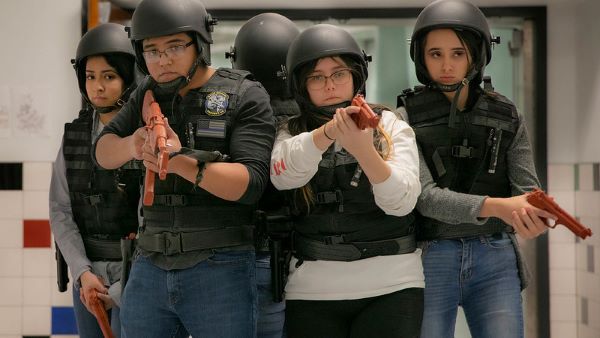
This insightful documentary profiles three El Paso, Texas, Mexican-American teenagers who want to work as U.S. Border Patrol agents. All are heavily involved with their local high school’s Criminal Justice Club, which prepares students for a law enforcement career after they graduate.
When we first meet Mason and Cesar, they are decked out in tactical gear and participating in simulated drug busts and other drills. Meanwhile, Cristina, a former club member who has already graduated, is now in a border patrol trainee program. For Cristina and Cesar, what initially drew them to law enforcement was the money and the chance to help their community, while for Mason, it was to socialize.
The club’s instructors push the kids as a statewide competition, the Border Challenge, looms not too far in the distance. One is a hard-ass, while the only female teacher, Ms. Weaver, is sweet and maternal. The third, Mr. Jimenez, lies somewhere in between (though a late scene in which he gets real about the negatives of a law enforcement career makes one wish he had more screen time).
Initially, At the Ready seems incredibly in favor of the modern-day criminal justice system, with constant reminders of the good pay that comes with being a border patrol officer in El Paso. In addition, in a scene involving Cristina’s parents set around the kitchen table, her father vehemently defends border agents against accusations of racism and praises them for protecting immigrants.
But as the year passes, real-life events happen that begin to shake the trio’s beliefs, such as news of the 2018 so-called “immigrant caravan,” which consisted of Central American migrants who were making their way north through Mexico. Different members of the club disagree over whether to militarize the U.S./Mexico border, leading Ms. Weaver to organize debates in which we see just how thoughtful the students can be on the issues.
Another source of drama involves their personal lives as the three come out as gay, develop a burgeoning interest in politics, or reconnect with an estranged parent. These subplots begin to interfere with their ability to focus on the club and pushes it to the periphery. At the same time, it’s remarkable to witness their visions of both themselves and their futures change so much in such a relatively short period of time.
The film is less successful as the latest entry in the high school competition/sports genre, despite the team gradually improving in the required skills. Director Maisie Crow counts down the days until the Border Challenge, perhaps as a way to build suspense, but what’s missing is a little more background about the actual rules (how points will be assessed and taken away). It’s as if Crow saw the proverbial writing on the wall—that her subjects were starting to outgrow the club—and pivoted the narrative so it was more about their coming of age via hard moral decisions than how the Criminal Justice Club shaped their lives
Meanwhile, the climactic graduation ceremony is surprisingly muted in tone, which makes sense given how much more uncertain these young people feel about their futures. The ending is, at best, cautiously optimistic. On the other hand, the way in which the three begin to resolve their respective conflicts implies some things in life are more important than a good salary, and that’s a worthy message.
















Leave A Comment